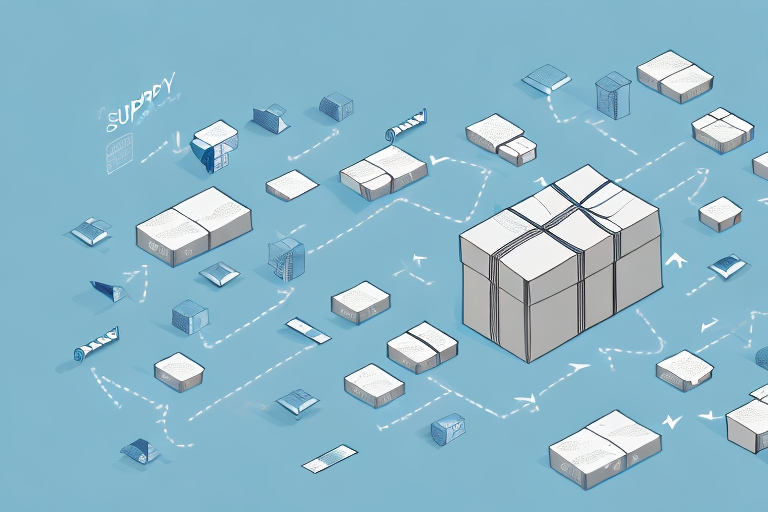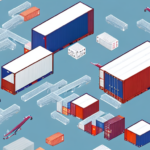How a Container Freight Station Can Streamline Your Logistics Process
If you are involved in international trade, you understand that logistics can be a significant challenge. Managing variables such as shipping times, routes, customs clearance, warehousing, and transportation can be complex and time-consuming. However, it doesn't have to be. In this article, we'll explore the benefits of using a container freight station (CFS) to streamline your logistics process and offer practical advice on selecting the right provider for your business.
Understanding the Basics of Container Freight Stations
A container freight station (CFS) is a facility that offers a range of services related to containerized cargo, including packing, unpacking, storage, consolidation, de-consolidation, and bonded warehousing. CFS providers collaborate with carriers, freight forwarders, customs brokers, and other stakeholders to ensure that cargo is efficiently managed throughout its journey from origin to destination.
CFS facilities are typically located near major ports and transportation hubs, making them ideal for companies that need to move goods quickly and efficiently. Partnering with a CFS provider can simplify your logistics process and reduce the risk of delays, damage, and other issues commonly associated with international trade.
One key advantage of using a CFS provider is their expertise in navigating complex customs regulations and procedures. CFS providers possess a deep understanding of the various rules and regulations governing international trade, ensuring that your cargo complies with all relevant laws. This expertise can help you avoid costly fines and penalties and expedite the customs clearance process, allowing your cargo to reach its destination more swiftly.
The Benefits of Using a Container Freight Station for Your Logistics Process
Utilizing a container freight station for your logistics process offers numerous advantages, including:
- Streamlining Operations: CFS allows you to consolidate and deconsolidate cargo more efficiently, reducing the need for multiple trips and transfers.
- Cost Savings: CFS providers often offer competitive rates, helping you lower your overall shipping costs.
- Improved Logistics Management: Partnering with a CFS provider leverages their expertise, reducing the burden on your staff and enhancing logistics management.
- Reduced Risk of Loss or Damage: CFS facilities are designed to protect cargo from damage, theft, and other risks, providing added peace of mind.
- Enhanced Supply Chain Visibility: With real-time tracking and monitoring systems, you can easily track your cargo's location and status, enabling informed decision-making.
- Value-Added Services: Many CFS providers offer additional services such as customs clearance, warehousing, and distribution, further streamlining your logistics process.
According to a 2023 International Logistics Report, companies utilizing CFS providers have seen a 20% increase in operational efficiency and a 15% reduction in logistics-related costs on average.
What to Look for in a Container Freight Station Provider
When selecting a container freight station provider, consider the following factors:
- Experience and Expertise: Choose providers with a proven track record and experience handling the type of cargo you need to transport.
- Location: Proximity to major ports and transportation hubs can significantly impact shipping times and efficiency.
- Pricing: Compare rates to ensure competitive pricing without compromising on service quality.
- Technology and Tools: Providers offering advanced tracking and visibility tools can enhance your supply chain management.
- Customer Service: Responsive and supportive customer service is crucial for addressing any issues that may arise promptly.
- Safety and Security: Ensure the provider has strong safety records and robust security measures to protect your cargo.
For more insights, refer to the ShipScience guide on choosing a CFS provider.
How to Choose the Right Container Freight Station for Your Business Needs
To select the right container freight station for your business, start by assessing your specific requirements and goals. Consider factors such as the type of cargo you need to transport, destination preferences, and required delivery timelines. Collaborate with potential providers to develop customized logistics solutions that meet your needs, taking into account transit times, packaging requirements, and customs clearance procedures.
Evaluate the reputation and reliability of the CFS provider by checking customer reviews, certifications, and accreditations that demonstrate their commitment to quality and safety. Additionally, assess the level of customer service and support offered, as this can be crucial for ensuring a smooth shipping experience.
The Role of Technology in Streamlining Logistics Processes through a Container Freight Station
Technology plays a pivotal role in enhancing logistics processes through a container freight station. Advanced tracking and visibility tools enable real-time monitoring of your cargo's status from departure to arrival, facilitating informed decision-making regarding shipment scheduling, inventory management, and resource allocation.
Digital platforms and software improve communication and collaboration among shippers, carriers, and freight forwarders, ensuring coordinated and efficient delivery of goods. Moreover, technology enhances cargo security by utilizing tracking devices and sensors that monitor the condition and location of goods, detect tampering or theft attempts, and alert authorities in case of emergencies.
According to the 2023 Logistics Technology Trends report, companies integrating advanced technology with their CFS operations have experienced a 25% improvement in shipment accuracy and a 30% reduction in transit times.
Ways to Optimize Your Logistics Process with a Container Freight Station
After selecting a container freight station provider, optimize your logistics process through the following strategies:
- Optimizing Cargo Packing: Collaborate with your provider to determine the most efficient packing methods to minimize wasted space and reduce shipping costs.
- Just-In-Time Delivery: Schedule shipments to arrive just in time for production needs, reducing excess inventory and handling costs.
- Consolidating Shipments: Combine multiple shipments into a single container to lower costs and enhance efficiency.
- Optimizing Inventory Management: Utilize advanced tracking tools to monitor inventory in real-time, enabling accurate forecasting and resource allocation.
- Choosing the Right Mode of Transportation: Depending on distance and cargo type, consider rail or intermodal transportation for cost-effectiveness.
Effective communication with your CFS provider is essential. Set clear deadlines, provide detailed cargo information, and promptly address any issues to ensure a seamless logistics process.
Overcoming Common Challenges in Logistics with the Help of a Container Freight Station
Despite the benefits, challenges such as delays, disruptions, and unexpected costs can arise in logistics. Partnering with a CFS provider can help you overcome these obstacles by leveraging their expertise and resources.
Visibility and Control: Lack of visibility over goods movement can cause delays and increased costs. Utilizing a CFS provides greater visibility through real-time tracking and monitoring, enhancing control over shipments.
Complex Customs Regulations: Navigating international customs can be daunting. A CFS provider assists with customs clearance and documentation, ensuring compliance with all necessary regulations and avoiding potential delays or penalties.
Case Studies: Real-Life Examples of Companies Streamlining Their Logistics Process with a Container Freight Station
Here are some real-life examples of companies benefiting from using a container freight station:
- Global Retailer: A global retailer sourcing products from Asia consolidated shipments through a CFS provider, reducing shipping time by 30% and lowering costs by 25%.
- Manufacturer: A manufacturer exporting to Europe partnered with a CFS provider, streamlining their logistics process, reducing transportation costs by 20%, and improving delivery times by 40%.
- Food and Beverage Distributor: By using a CFS provider offering temperature-controlled storage, a distributor reduced product spoilage and damage by 15%, increasing customer satisfaction.
- Fashion Retailer: A fashion retailer improved inventory management with real-time tracking from a CFS provider, reducing stockouts and increasing sales by 10%.
Future Trends in Container Freight Stations and Their Impact on the Logistics Industry
Looking forward, container freight stations are set to play an increasingly vital role in the logistics industry. Advancements in technology and automation are expected to drive greater efficiency and cost savings. Furthermore, the evolving landscape of global trade will emphasize the importance of logistics optimization. Companies that embrace these trends and collaborate closely with their CFS providers to develop customized logistics solutions will be well-positioned for success.
Conclusion
Utilizing a container freight station can significantly enhance your logistics process by offering greater efficiency, cost savings, and peace of mind. Partner with an experienced provider, leverage advanced technology, and optimize your logistics strategies to achieve your business goals. Assess your needs carefully, choose the right CFS provider, and collaborate closely to ensure a streamlined and effective logistics operation.






















